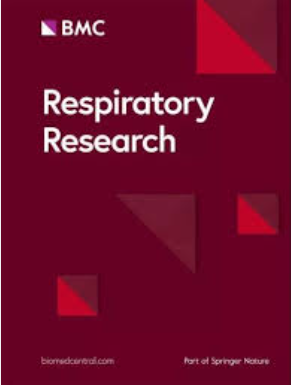作为肺动脉高压血清生物标志物的染色体外环状 DNA 的差异表达和分析
IF 4.7
2区 医学
Q1 RESPIRATORY SYSTEM
引用次数: 0
摘要
据报道,染色体外环状DNA(eccDNA)在各种疾病的发生和发展中起着关键作用。然而,cccDNAs在肺动脉高压(PAH)中的特征和作用仍不清楚。在发现队列中,我们首先通过循环测序分析探索了cccDNA的表达谱。通过常规聚合酶链反应(PCR)、TOPO-TA 克隆和 Sanger 测序验证了候选 eccDNA。在验证队列中,招募了 30 名 PAH 患者和 10 名健康对照者进行 qPCR 扩增,以检测候选 eccDNAs。研究人员收集了基线数据,包括临床背景、生化变量、超声心动图和血液动力学因素。利用接收者操作特征曲线研究cccDNA的诊断效果。我们在3名IPAH患者和3名健康人的血浆样本中总共鉴定出21741个ccDNA,并对ccDNA的表达频率、GC含量、长度分布和基因组分布进行了全面的表征和分析。在验证队列中,与健康对照组相比,687个ccDNA在IPAH患者中存在差异表达(筛选阈值:|FC|≥2且P<0.05)。基因本体(GO)和京都基因组百科全书(KEGG)通路分析表明,IPAH患者的特异性cccDNAs在钙通道活性、丝裂原活化蛋白激酶通路和wnt信号通路中显著富集。验证队列发现,eccDNA-chr2:131208878-131,424,362在PAH中的表达量远高于健康对照组,在预测PAH方面具有很高的准确性,灵敏度为86.67%,特异度为90%。此外,相关性分析表明,血清eccDNA-chr2:131208878-131,424,362与平均肺动脉压(mPAP)(r = 0.396,P = 0.03)、6 分钟步行距离(6MWD)(r = -0.399,P = 0.029)、N-末端前 B 型钠尿肽(NT-proBNP)(r = 0.685,P <0.001)和心脏指数(CI)(r = -0.419,P = 0.021)。这是首次对 PAH 患者的 eccDNA 进行鉴定和表征的研究。我们发现血清cccDNA-chr2:131208878-131,424,362显著过表达,可用于PAH的诊断,这表明它具有作为一种新型非侵入性生物标记物的潜力。本文章由计算机程序翻译,如有差异,请以英文原文为准。
Differential expression and analysis of extrachromosomal circular DNAs as serum biomarkers in pulmonary arterial hypertension
Extrachromosomal circular DNAs (eccDNAs) have been reported to play a key role in the occurrence and development of various diseases. However, the characterization and role of eccDNAs in pulmonary arterial hypertension (PAH) remain unclear. In the discovery cohort, we first explored eccDNA expression profiles by Circle-sequencing analysis. The candidate eccDNAs were validated by routine polymerase chain reaction (PCR), TOPO-TA cloning and Sanger sequencing. In the validation cohort, 30 patients with PAH and 10 healthy controls were recruited for qPCR amplification to detect the candidate eccDNAs. Datas at the baseline were collected, including clinical background, biochemical variables, echocardiography and hemodynamic factors. Receiver operating characteristic curve was used to investigate the diagnostic effect of the eccDNA. We identified a total of 21,741 eccDNAs in plasma samples of 3 IPAH patients and 3 individuals in good health, and the expression frequency, GC content, length distribution, and genome distribution of the eccDNAs were thoroughly characterized and analyzed. In the validation cohort, 687 eccDNAs were differentially expressed in patients with IPAH compared with healthy controls (screening threshold: |FC|≥2 and P < 0.05). Gene Ontology (GO) and the Kyoto Encyclopedia of Genes and Genomes (KEGG) pathway analysis showed that the specific eccDNAs in IPAH were significantly enriched in calcium channel activity, the mitogen-activated protein kinase pathway, and the wnt signaling pathway. Verification queue found that the expression of eccDNA-chr2:131208878–131,424,362 in PAH was considerably higher than that in healthy controls and exhibited a high level of accuracy in predicting PAH with a sensitivity of 86.67% and a specificity of 90%. Furthermore, correlation analysis disclosed a significant association between serum eccDNA-chr2:131208878–131,424,362 and mean pulmonary artery pressure (mPAP) (r = 0.396, P = 0.03), 6 min walking distance (6MWD) (r = -0.399, P = 0.029), N-terminal pro-B-type natriuretic peptide (NT-proBNP) (r = 0.685, P < 0.001) and cardiac index (CI) (r = − 0.419, P = 0.021). This is the first study to identify and characterize eccDNAs in patients with PAH. We revealed that serum eccDNA-chr2:131208878–131,424,362 is significantly overexpressed and can be used in the diagnosis of PAH, indicating its potential as a novel non-invasive biomarker.
求助全文
通过发布文献求助,成功后即可免费获取论文全文。
去求助
来源期刊

Respiratory Research
医学-呼吸系统
自引率
1.70%
发文量
314
期刊介绍:
Respiratory Research publishes high-quality clinical and basic research, review and commentary articles on all aspects of respiratory medicine and related diseases.
As the leading fully open access journal in the field, Respiratory Research provides an essential resource for pulmonologists, allergists, immunologists and other physicians, researchers, healthcare workers and medical students with worldwide dissemination of articles resulting in high visibility and generating international discussion.
Topics of specific interest include asthma, chronic obstructive pulmonary disease, cystic fibrosis, genetics, infectious diseases, interstitial lung diseases, lung development, lung tumors, occupational and environmental factors, pulmonary circulation, pulmonary pharmacology and therapeutics, respiratory immunology, respiratory physiology, and sleep-related respiratory problems.
 求助内容:
求助内容: 应助结果提醒方式:
应助结果提醒方式:


